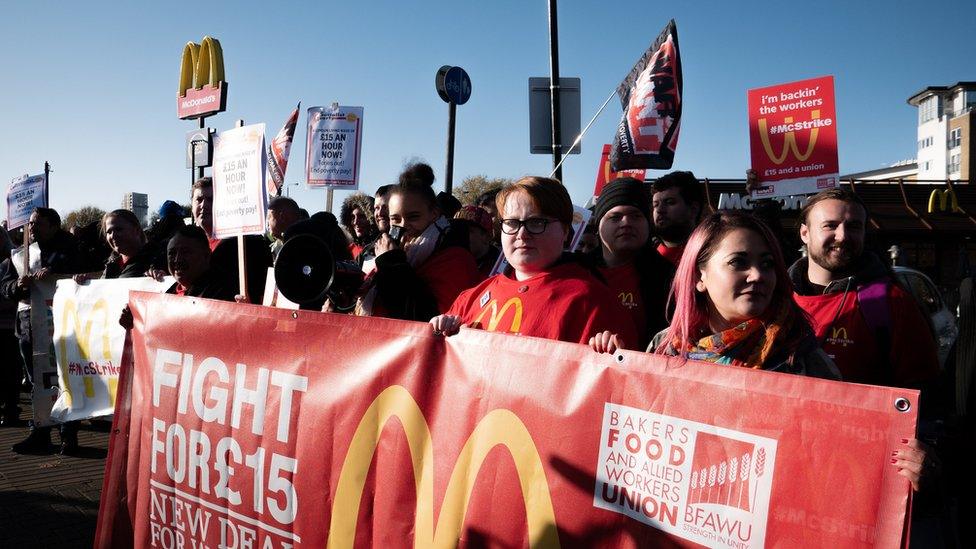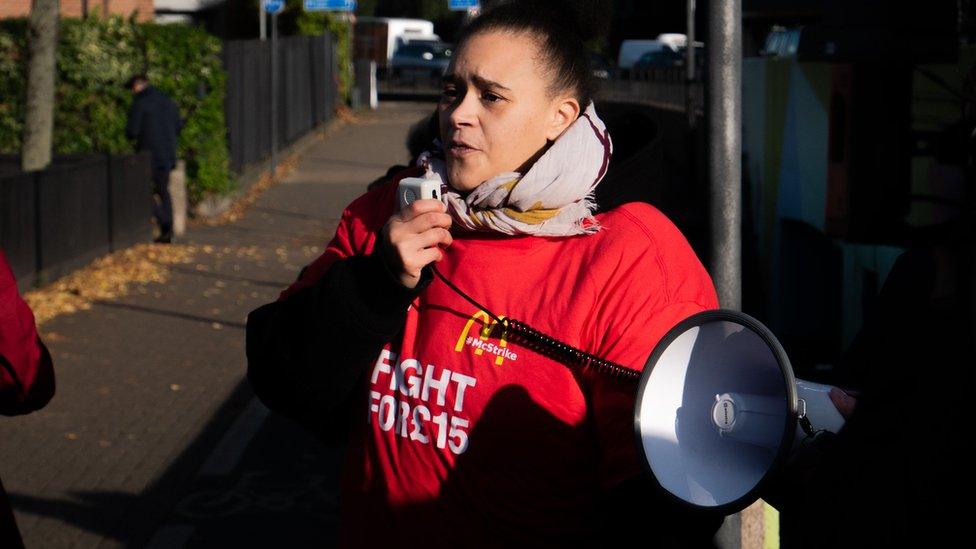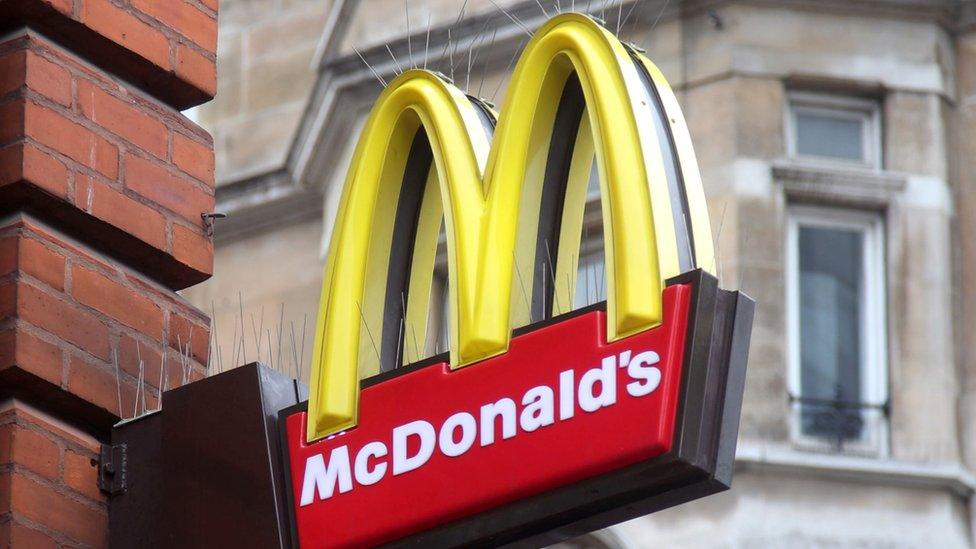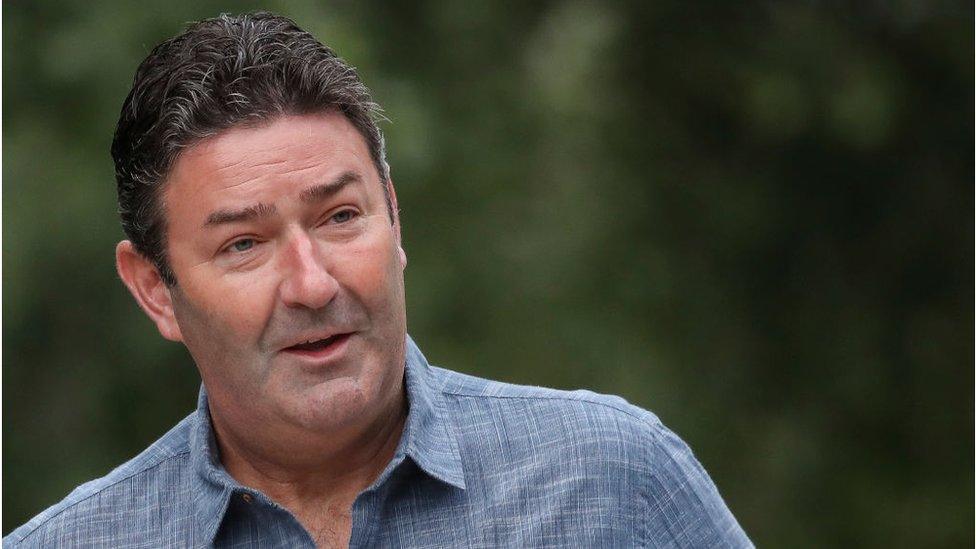McDonald's UK staff join global day of protests over pay
- Published

McDonald's protesters in London
McDonald's workers in the UK have gone on strike as part of a global day of protests over pay.
Staff at six London stores walked out, while protests were held across the UK. There was also action in the US, France, Germany, Brazil and Chile.
McDonald's said that the strikers represented a "tiny proportion" of its UK workforce.
The fast food giant was also hit with a legal action in the US over sexual harassment claims.
The lawsuit alleges rampant harassment at a Michigan McDonald's franchise, which went ignored by management and was "emblematic" of a broader problem at the company.
The filing adds to roughly 50 complaints filed against the company in recent years over sexual harassment, according to the Time's Up Legal Defense Fund, which is working on the suit.
McDonald's has said it has revamped its harassment training and policies in recent years and is working with its franchises to implement the updates. However, lawyers working on the suit say their clients have seen little change.
"They are the definition of window dressing," said Gillian Thomas, of the American Civil Liberties Union, which is working on the issue.
Workers in the protests are demanding an end to "poverty pay" rates and better terms and conditions.
In the UK, McDonald's workers are calling for a rise in pay to £15 an hour - over a third more than what they currently earn.

Melissa Evans said McDonald's workers deserve more respect
They also want an end to youth rates, the choice of guaranteed hours of up to 40 hours a week, notice of shifts four weeks in advance and recognition of their union, the Bakers, Food and Allied Workers' Union (BFAWU).
An employee at Crayford McDonald's in London, Lewis Baker, said he will be striking because he struggles to pay rent on his income of £8.80 an hour.
Mr Baker, 29, said: "There are a lot of workers who are struggling to pay their bills and get by day to day.
"We don't have set hours, so we don't always earn enough to pay the bills.
"If we got £15 an hour, it would have a massive impact - I would be able to afford to pay my rent, to pay my bills, go on holiday and have some kind of work-life balance."
'Poverty pay'
Melissa Evans, 32, a mum who works at McDonald's in Wandsworth Town, London, said McDonald's workers deserved "the same level of respect as everyone else".

"We are coming together to tackle poverty pay, insecurity of hours and lack of respect, which has gone on at McDonald's for too long."
This is the fourth time McDonald's workers in the UK have gone on strike since September 2017, with each successive strike getting bigger.
There has also been strike action around the world over the fast-food giant's pay rates, with thousands walking out in the US.
The company has faced criticism for paying executives large salaries, while employees on the shopfloor struggle to get by.
There were protests in five German cities on Tuesday, including Berlin and Hamburg, and also in Belgium. There were protests in Israel last week, and action is expected in New Zealand next week.
'Fighting back'
Former boss Steve Easterbrook - who was fired last week for having a relationship with an unnamed employee - received remuneration of $15.9m in 2018. That was 2,124 times the median McDonald's employee salary of $7,473.
The UK's shadow chancellor, John McDonnell, who joined workers outside Downing Street, the prime minister's residence in central London, said low pay and insecure work were "endemic" in the fast-food industry.
Owen Espley of charity War on Want, which is backing the strikes, said McDonald's workers were exploited but were "fighting back. [They are] demanding respect and a fair share of the profits".
Speaking about the action in London, a McDonald's spokesman said: "We are extremely disappointed that a very small number of our people in just a handful of our restaurants are considering industrial action.
"We understand only nine people are involved across six restaurants, which is a tiny proportion of our 130,000 workforce and 1,300 restaurants."
- Published4 November 2019
